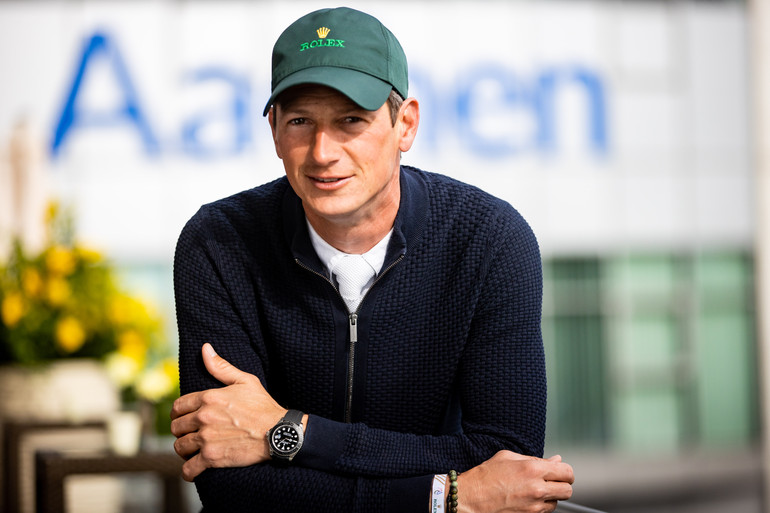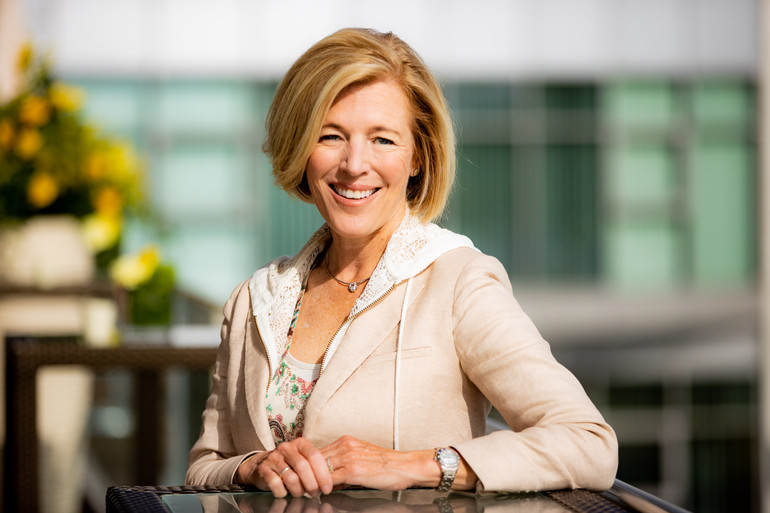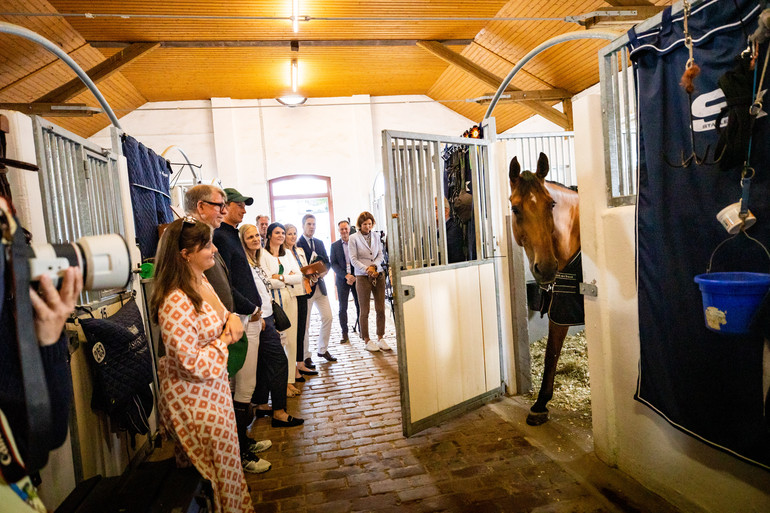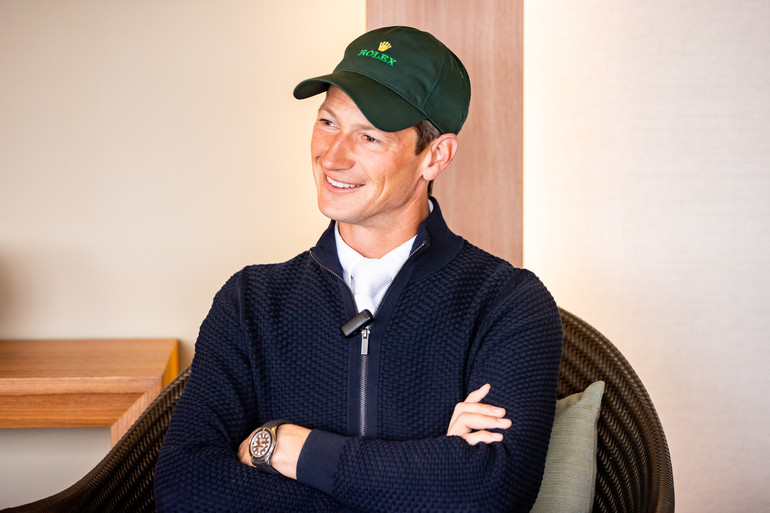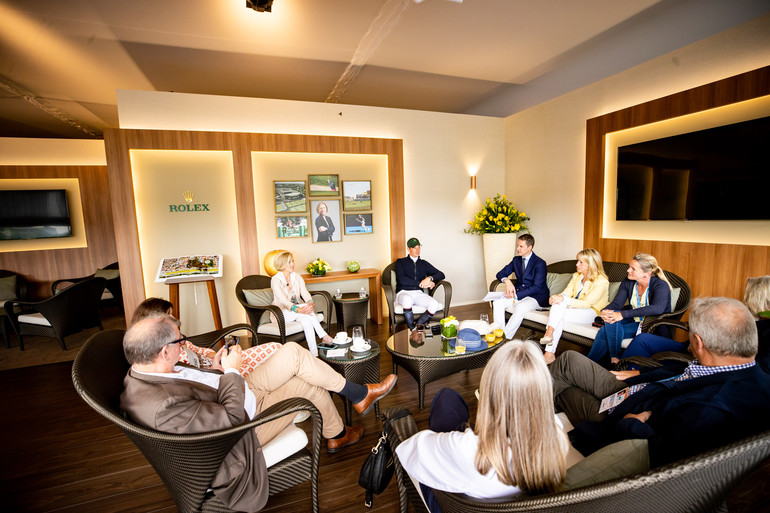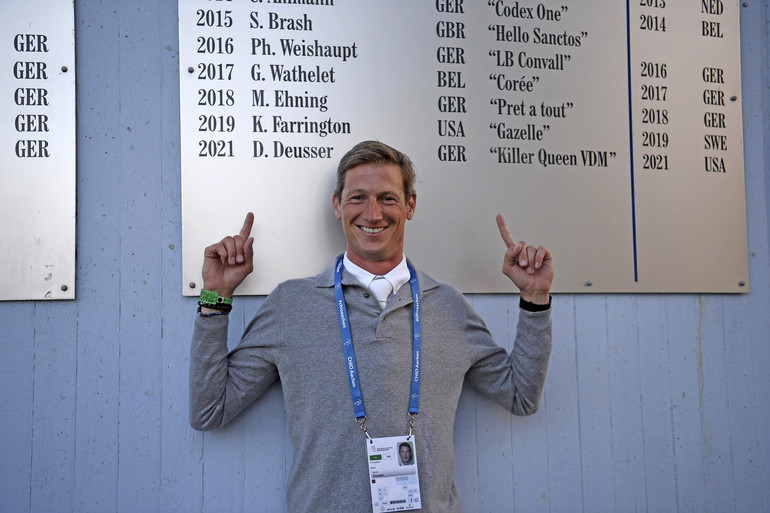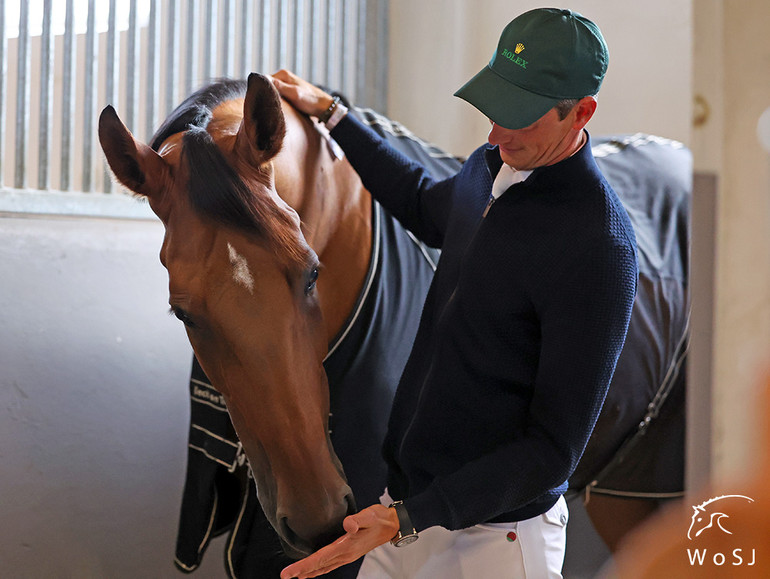Meredith, you won the CHIO Aachen Rolex Grand Prix on Shutterfly in 2005, can you take us back to that time and tell us how it felt?
Meredith: The Rolex Grand Prix here at CHIO Aachen is the pinnacle of the sport, it is something that all of the top riders measure them against. Winning that class is something that we all aim to do. For me personally, it was a dream come true. I first came to CHIO Aachen as a young American girl, and I remember when I first came to the venue I was blown away. Many years later I return as a rider and on the first day, which I think was a Monday, I went in the main arena when it was empty, and I sat down on the grass and looked around – I just thought about what an honour it was to even be riding here. Then after years after that moment to win the Rolex Grand Prix with my great horse Shutterfly was incredible. He is now 29 years old and living in a big grass field behind my house, so I see him every day.
The Rolex Grand Prix here at CHIO Aachen is the pinnacle of the sport, it is something that all of the top riders measure them against
Meredith: The partnership that I had with him is something that only comes once in a lifetime and so to win this class with a horse like him meant so much to me. I was so focused and motivated to win the class, and so for it to actually happen was surreal. I remember I was early in the jump-off, and there were only five or six horses – so I went into the shoot to watch the rest of the horses jump. My husband Marcus was so nervous that he could not watch and so he walked away. I still remember the feeling when Dirk Demeersman riding his great stallion Clinton was slower than me and I realized that I had won. It was such a wonderful achievement, and something that I will always have in my heart and share with my horse and all the amazing people around me that helped it happen.
Daniel, your dream came true last year – how are you feeling defending your title but also being the live contender of the Rolex Grand Slam?
Daniel: It is so lovely to hear Meredith talk about her special moment here 17-years-ago, and the way that I feel about my victory is very similar. I remember after I had won the Rolex Grand Prix last year, I had phone calls from riders who had won before saying that I was now a real rider. I had been second in the class twice before and you then start doubting yourself and whether those were your chances to win. But finally last year I managed to achieve my dream. Killer Queen VDM is an unbelievable horse, and it truly was an unbelievable day and a memory I will never forget.
CHIO Aachen is such a unique and special show, especially as a German rider
Daniel: Returning to the show as the live contender of the Rolex Grand Slam but also as now a Rolex Testimonee I am feeling some pressure, and everyone is talking about me winning again. I rode Killer Queen VDM in a small class 1.45m earlier in the week, and I am jumping her in the big class today [Saturday], to ensure she is her best on: Sunday. CHIO Aachen is such a unique and special show, especially as a German rider, and the Rolex Grand Slam of Show Jumping has really added to it. There is a lot of pressure on me and so I need to figure out way to leave that all behind and concentrate on my round on Sunday.
Meredith, what advice would you give Daniel?
Meredith: I don’t think that Daniel needs my advice – he is a true professional, he knows the focus, partnership and concentration that it takes to win here. Our sport is unique we are not dealing with a racquet or golf club, but an animal with moods, feelings and thinks on their own. Daniel knows that you have to have all everything come together for you to win here against the best in the world.
How does it feel to be the most successful female show jumping rider making it to world number one?
Meredith: I never dreamt that I would get to where I got. I had always dreamt of winning the Rolex Grand Prix at CHIO Aachen, but I never dreamt that I would be the first female world no.1 or the first female to represent the prestigious German team in championships. I could not have imagined what I became in my wildest dreams; and I feel that I have been able to open doors up for other female riders and I am really grateful for that opportunity. I see the hope that my daughter as well as the motivation and the dreams she has, and I feel that it is now possible for women to achieve their dreams.
Can you explain the importance of time and your personal relationship with time?
Meredith: Equestrianism is all about time and ensuring that your horse peaks at the right time. Daniel mentioned this earlier in the fact that he is riding his horse today to make sure she is in peak condition for Sunday.
Equestrianism is all about time and ensuring that your horse peaks at the right time
Can you train your horse to be quicker?
Daniel: Yes, you can definitely train your horse to become quicker, but often in an important class your position in the jump-off will influence how quickly you go and the risks you take. In the Prize of Europe class on Wednesday, we were able to walk the jump-off course beforehand, so we all had a plan of how we wanted to ride the course. However, after seeing Martin Fuchs and McLain Ward, I knew that I would have to take some risks and go out of my comfort zone to be faster than them. As rider you can make tighter turns and cut the corners, but the most important thing is to keep the poles up. Riders also know their horses and whether they are naturally fast or whether you need to take risks to the last few fences in order to win.
The time penalty rule has now changed so it is one fault for one second – do you like that rule?
Daniel: In my opinion, nobody really communicated the rule [which came in from 01 January 2022] and I think that the change is too large. If they wanted to make the time more influential then they maybe should have changed it to two seconds equalling one fault. I think the gap is way too big. If you want to make the time more important, it would have been enough to have one time fault for every two seconds over. It’s a big and long discussion, but I’m not sure it’s necessary for riders to get such big scores due to time faults.
Meredith, you were here last night watching the Nations Cup, with the atmosphere and packed stadium, do you think you would ever compete here again?
Meredith: If I find another horse that’s comparable to Shutterfly, then maybe yes! I’ve had so many wonderful horses in my career, so I would only do it if I found that special partnership again with a great horse. I’m so enjoying my life now, being a trainer, giving something back to young people in particular, now I am training a lot of young people, my daughter as well, it’s giving me such a lot of pleasure. It seems like it’s come at the right time for me to make that transition, but when I come to this event, I get excited and wouldn’t rule it out!
Meredith, are you still out there looking for the next Shutterfly?
Meredith: All the time, my husband and I are always looking for young horses, it’s part of our business – we are buying them and selling them, and we are always looking. I often hear people say, “this one is going to be your comeback horse”, but we’ll see, we’re still waiting!
How are you finding it now with your daughter following in your footsteps?
Meredith: It’s really nice because I can relive so many of the experiences, I had through her. I can see the passion, the hope, the excitement. She’s living it and it’s precious for me. I have a different role now, I’m extremely nervous, but it’s not around winning, it’s about safety and going well – I know how dangerous this sport is and I know what it takes to put yourself on the line in a dangerous sport, so my heart is going when I watch her and it’s a whole new perspective for me. I’m so enjoying it though, it’s so nice that I can relive it once again.
Are horses impacted by the atmosphere and scale of a show such as CHIO Aachen?
Daniel: There are definitely different characters – there are horses that like this arena and there are horses that get a bit shy in an arena like this. Killer Queen has always been very competitive here, she won classes here as a youngster, she won when she was nine years old, and of course the Rolex Grand Prix last year. I came into the arena on Tuesday to do some flatwork training, and the moment she goes into the arena she gets very excited, which is a good thing in one way, but can also cause problems if you lose a bit of control. But some horses are completely the opposite and are quite phased by the big arena and bright lights. It is also a different style of jumping – here you have one jump at a time with a lot of space in between and it looks massive as you approach it from so far away, whereas at other shows you might have 16 fences in a small space with fences coming very soon after one another. The space and scale can make the horses lose a bit of confidence and that can make you lose a fraction of a second, which might be the different between winning and second place.
There are horses that you ride into this arena, and they get bigger, and there are horses that you ride in, and they get smaller
Meredith: There are horses that you ride into this arena, and they get bigger, and there are horses that you ride in, and they get smaller. We both would prefer the ones that get bigger! Shutterfly on his best day, when I trotted in the ring and the whole stadium was clapping, I felt like I was on Superman. He was a very shy and sensitive horse, but when he came into the arena, was wanted to show his stuff, and Checkmate was the same. Great horses get bigger in an arena like this and the ones we don’t really want to ride get smaller.
What about the young horses, is there a moment you get that inner feeling 'this one will be right for me, the perfect partner to win'?
Meredith: I think we all, as professionals, see a horse, recognise its talent, but we go through ups and downs. There are times where we think they will win the Rolex Grand Prix, and then there are times when we think they will never make it. Back to your question about time as Daniel was explaining; I will never forget when I started Shutterfly, as a 7-year-old, I went in the first jump-off with him, and he’s a very sensitive horse, he's like a racehorse, and I had never been in a jump-off, I went to win, and he took the whole course down. I think there were maybe 2 fences left standing, because when I put leg on to make him go faster, he forgot to jump and was so flat over the fences. So, I realised over many years that the only way to ride him fast, was to ride him fast without him knowing, so never apply pressure, never aggressive, never with a lot of force, seat or leg, I learned I must always just let him use his natural speed without him knowing. I won the Rolex Grand Prix of Aachen with the same feeling - just letting him go without any force. So, your question is interesting; Shutterfly learned to be a great horse, yes, he had natural ability, but he learned so many things and I think that’s what made him a great horse in the end.
Is there a moment when you think 'this horse is at the top and could win a Rolex Grand Prix' and then afterwards you think, 'no chance'?
Daniel: Yes - at one point there is there. But that’s an interesting question because whilst we try to build up the horses to the top level, that’s only just one part. Keeping them on that level is actually far more difficult. Horses get used to us and the help that we give them, and to motivate a horse after 6 months or 1 year, you need different techniques that maybe worked the first time they won a Rolex Grand Prix, but not anymore. So of course, we try to constantly improve the horse; jumping higher, moving faster, little bit more consistent, but it is very very difficult to feel, as you say, 'now the top has come'. Training horses comes with a lot of surprises, I have to say, sometimes if the horse has a very good mind, and he wants to do it well; we talked about coming into the arena; maybe the horse is a little shy the first year, but the next year they are very confident - and then they jump 2cm higher or move half a second quicker, it’s not a lot, but you can always get them step by step a little better.
I have a question for both of you: both of you seem really open, and I think it’s because your families are really close, open and you share the same passion - is that a good assumption?
Daniel: We are really close with our families, but also with our colleagues. I try to learn from my colleagues as much as I can; we talk to each other; we learn from each other; we all have the same goals and the same problems. I think to find a horse to win the Rolex Grand Prix of CHIO Aachen is very, very, very rare. You can find horses that win on 60s, you can find horses that win a one-time Grand Prix, but here on Sunday it is really something unique. There are not so many horses in the world that are able to win the CHIO Aachen Rolex Grand Prix - or the CHI Geneva Rolex Grand Prix - they are really unique shows, and the moment we think 'yes, we have a horse for that', we are still so far away. We still have to educate them, try to get them better - we have so many different ideas and also so many different ways of riding; we have big jockeys, we have small jockeys, we have warm blood horses, we have more cold blood horses, some have more scope, some have a little bit less scope - there are so many techniques to try and get them better, I think it’s very important to be open and learn from each other.
It isn't just the love of the sport, it is the love of the animal, the love of the horse
Meredith: I think it’s our passion you know, it is nice to share your passion with your family, like I do with Marcus and my daughter. It isn't just the love of the sport, it is the love of the animal, the love of the horse. We are a constantly, as Daniel said, trying to get better in what we do - we are analysing, dissecting every round - I probably speak on behalf of Daniel too when I say; every time we go in the ring and something goes wrong, afterwards we look at the video, we discuss with our groom, with the vet, with our colleagues - and so the whole industry becomes a little bit like a family. We have friendships in this sport, and because the sport is fair, I don’t think there is a jealousy. It's a 'may the best man win' attitude, and the best man will win on Sunday. There won't be any argument on that, and I think all of that makes it a really interesting sport and allows us to speak openly about our form. Even now, when I'm not directly competing in the sport, Daniel might ask me; I have a horse that is similar to Shutterfly, what did you do when...? So, I think that makes it a really fun sport.
You've talked about your family relationships - how do you feel about your relationship with Rolex?
Meredith: Well, I must say I feel like I am part of the family - it’s a wonderful feeling. I have had my ups and downs and Rolex has always been there for me, always supported me like no other sponsor. I must say it’s a big honour - you always wonder 'are you only as good as your last ride', and that’s a hard way to live, but with Rolex I don't feel like that at all. I feel like I am accepted as I am, for what I have achieved, for the person I am today, whether it’s the mother of Brianne Beerbaum, or the wife of Markus Beerbaum, or the first women to ever be no1. I feel welcome and it makes you feel relaxed and good about yourself and proud of your achievements.
It’s like an unconditional love?
Meredith: Yes exactly.
Could you summarise in your own words the four Rolex Grand Slams and what makes them each unique?
Daniel: What makes them unique is not the question - these shows are the best shows in the world - we have Calgary and Aachen outside - there is not so much to explain if you know the shows, they are fantastic shows, that’s why the public come. Rolex helped create unbelievable prize money too which makes it unique! The indoor season at CHI Geneva and also S’Hertogenbosch, such great events - being indoors it is a little more difficult to create space, we have very big indoor shows, but the possibility to build and ride your horse in front of the fantastic crowd - it’s unbelievable.
The ambiance here is so unique
You have so many events around the year, do you plan around the Majors - where do they fit into your planning?
Daniel: We definitely plan around the Majors. We want to be competitive with our best horses, to win a Rolex Grand Slam again! In between we have a lot of other horses that we try to build up, to hopefully be here with in the next one, two, three years - maybe here or take them to Calgary, Geneva, Hertogenbosch - one of the Rolex Grand Slams.
What role does the public play – there are tens of thousands here - and I know there are lots of shows where there is a lot of prize money but very few spectators but here you have a roaring crowd everywhere - does this make a difference to you and your horse?
Meredith: Absolutely, the ambiance here is so unique. Geneva, the ambiance there is unbelievable. Just as you the spectator enjoys it, we as riders enjoy it! The best horses perform at their best, that’s the beauty of the best horses. I am always sad when we ride at shows with no spectators, or less spectators - clearly, we have training shows, I'm not talking about them, but the public are very important, when you’re striving to perform your best. People usually come as a result of the great venue, so I think yes, they are very important - for TV, for sponsors for everything.
Daniel: I don’t have much more to add. Personally, like last night, when I walk around - I was pretty relaxed, I went into the stands, and it is a great feeling to see all these people together again. Especially after the last two or three years, where at a certain moment, you ask yourself the question 'will it ever be the same again' - but yes! I actually enjoy standing and waiting for a drink and food. It’s just great.
Can you explain your relationship with Rolex before you were a Testimonee?
Meredith: The competition for the Juniors was the Senators Cup in the United States. My aim all year was to win this, because the winner received a gold Rolex. You can imagine what this was to a 14-year-old – a yellow gold Rolex! I had a trainer at the time, and I had an old horse, who was wonderful but a little old and creaky, so we rode him, then we rested him, then we took him to a show, then rested him again – we had a very complicated agenda, but low and behold we went to Washington DC, and we came home with the gold Rolex. That was my first Rolex and ever since then I’ve been enjoying Rolex!
Daniel: My first Rolex was the one I won in the Rolex Top 10 Final in 2013 in Stockholm.
Do you have a story about each of the watches you are wearing today and why have you chosen it?
Meredith: I always have a hard time choosing as I have a wonderful collection and they are all so beautiful. This is the watch that I won at the FEI World Cup™ Final with Shutterfly and is one of my favourites. It’s a white gold Lady Datejust – it’s traditional and beautiful.
Daniel: I chose my watch – Rolex Yacht-Master - because I like the black face and it’s just such a beautiful watch, and I have the Oysterflex bracelet because it is so comfortable when I am riding and competing.
When you won last year there was a smaller crowd and less atmosphere. Do you think it will be different this year?
Daniel: Yes, it will be different, but for me, the pressure will be no different. The atmosphere here is always thrilling, so it’s just important to focus on the course and not the surroundings and it will be an amazing event on Sunday.



